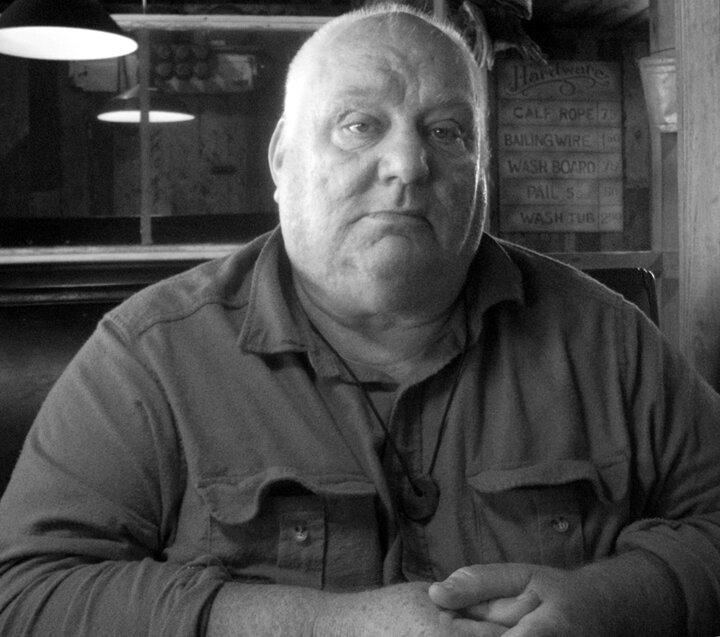"Cooking with Charlie" by Thomas Hubbard
Charlie Southerland, 2015, photo by Thomas Hubbard
Charlie Southerland, a vice president in Arkansas’ state-wide Poets Round Table, cooks barbecue in a region where barbecue is a high art form, in a state where it approaches religion. But he built the business in Enumclaw, near Seattle, years ago. He lived and worked in the area for seventeen years.
How he learned the art of barbecue, developed it into a business, and then moved it lock stock and barrel to the north central Arkansas village of Viola, amounts to a full-blown saga. A highlight of Charlie’s early years in Dexter, Missouri, was learning to cook in the Boy Scouts, at bivouacs and campouts with his friend, Bruce Vancil. Later, after they were grown, Bruce taught him how to cook barbecue. By then Bruce was plying his trade at the Hickory Log Restaurant, in Dexter. (Bruce now owns a chain of BBQ restaurants in Missouri and Arkansas.)
From Dexter, Charlie moved to a small town in Louisiana where he cooked at grocery store fronts and catered.
Next, he relocated to Enumclaw, Washington, where he continued catering. Charlie has provided barbecue for such divergent gatherings as Jewish weddings on Lake Union, luncheons for Weyerhaueser and Burlington Northern, and for the Roy Rodeo, the King County Fair, and the first Gay Rodeo in King County. He once traded barbecue with Sholdt Jewelers (Brian Sholdt’s wedding) for Charlie’s and his wife’s wedding rings.
Charlie enjoys talking about poetry as much as he enjoys barbecue. “I write free verse as well as formal poetry,” he said, “but I’ve been concentrating on formal poetry for about three years now. It seems to make my free verse better.” Perhaps concentrating makes everything better.
He won the most humorous poem award (a sonnet called “Farm Girl”) in the 2013 Maria W. Faust Sonnet Contest at the Great River Shakespeare Festival, and has been published in The Rotary Dial (a literary magazine friendly to formal poetry). Charlie’s poem, “Eclipse,” appeared in the Autumn, 2014 issue of Trinacria magazine, and has been nominated for a Pushcart Poetry Prize by Dr. Joseph Salemi, publisher of Trinacria.
However, life has delivered Charlie some hard knocks too. Returning to Enumclaw from a Missouri turkey hunting trip one night, he stopped at an accident site involving a fatality and some serious injuries, and got out of his vehicle to help. “An old woman came barreling along the highway,” Charlie recalls, “she hit me, tearing my right leg off.” The insurance settlement was large enough that he could purchase a two hundred and forty acre farm near Viola, in Fulton County, Arkansas, and that’s where he still cooks barbecue today.
Charlie Southerland hopes his “Cooking Ribs with Charlie” sonnet sequence will help anyone desiring to barbecue ribs.
Cooking Ribs with Charlie
You start with spare ribs only, good and fresh.
Sometimes they’re vacuum packed, but that’s alright
because at Walmart they are reddish flesh.
There shouldn’t be a sour smell or sight
of mold. You turn them gut side up and strip
the membrane, trim the flap, and cut the fat
away, because nobody likes it, flip
the slab and wipe it down with brine then pat
it dry, apply the spices evenly
and let it set refrigerated. Start
the grill with oak briquettes, then leniently
you lay the hickory and cherry heart.
Resist the urge you have to stroke and poke.
You wait until you see the Papal smoke.
Before you start to cook the ribs, a note
or two about success—make sure the fire
is banked against one side, the creosote
won’t build upon the grill. I like the pyre
a little hot to start, then let it cool
a bit. Then place the ribs just opposite
away from heat and close the lid. The rule
I follow is to set the damper right
above the meat so all the smoke can jam
the rub or brine and heat the bones which cooks
the meat with slow convection, not the wham
of charring burgers, dogs or brats. One looks
for rigor, stiffness, tenderness, and feel.
Don’t let the amateurs screw up the deal.
You take the ribs out, cut the chine-bone off.
It lets the ribs more evenly take heat.
You place the bone side down, not up, they trough
the juice and cook all wrong, so lay them neat
just like I said, then place the chine bone near
the skinny side to shield the smaller bones
from too much fire, so they won’t shrink or sear
too fast. Then turn off all your telephones.
For three some hours, give or take, don’t let
a soul distract you from this work of love
you make. Bring up the temperature and set
the damper right; don’t let it get above
two-forty. Check them every hour. Buy beer
and call me over when they’re done, you hear?
—Charlie Southerland
Published in Raven Chronicles, Vol. 21, Laugh. Laugh? Laugh!, 2015.
